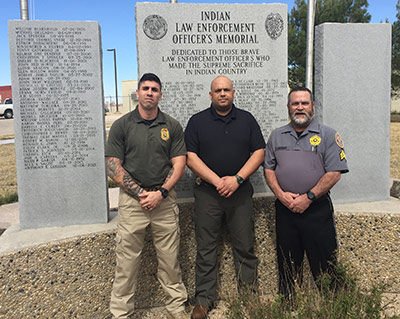Contact Us
To provide feedback on the Community Policing Dispatch, e-mail the editorial board at CPDispatch@usdoj.gov.
To obtain details on COPS Office programs, publications, and resources, contact the COPS Office Response Center at 800-421-6770 or AskCopsRC@usdoj.gov

U.S. Department of Justice
Office of Community Oriented Policing Services
Washington, DC 20530
 In 2015, when Bruce Lee became the first public safety director of the Poarch Band of Creek Indians in Atmore, Alabama, he faced some unexpected challenges. After 33 years working in a wide variety of law enforcement positions, including 12 years as a captain with the Mobile County (Alabama) Sheriff’s Office, he thought he’d pretty much seen it all. But the jurisdictional issues that tribal law enforcement must work with are unique as well as very complicated.
In 2015, when Bruce Lee became the first public safety director of the Poarch Band of Creek Indians in Atmore, Alabama, he faced some unexpected challenges. After 33 years working in a wide variety of law enforcement positions, including 12 years as a captain with the Mobile County (Alabama) Sheriff’s Office, he thought he’d pretty much seen it all. But the jurisdictional issues that tribal law enforcement must work with are unique as well as very complicated.
Tribal jurisdiction over criminal matters is a complex web of tribal, federal, and state jurisdiction depending on several specifics, including the location and details of the offender and victim. Tribal law enforcement officers who enforce tribal law may not be allowed to enforce state laws or have jurisdiction beyond their territorial borders. Of the 36 states that include Indian country, only 14 have granted authority to tribal law enforcement to enforce state laws; and even those states may place constraints on that authority such as limiting each tribe’s authority to offences occurring within the geographic boundaries of their reservation.
Limited Authority Limited Legal Rights and Policing Power

Left to right: Public Safety Division Director Bruce Lee, Lead Dispatcher Susan Rolin, Tribal Police Chief Mike Reynolds
This left Poarch Creek and their guests on tribal land, which includes casino properties, vulnerable to state crimes committed by non-Indians. What’s more, the many tribal members who lived off-reservation could easily avoid tribal arrest warrants by never setting foot on the reservation. In addition to violating victims’ rights, these restrictions had a negative effect on the morale of the tribal police department.
The Need for State Authority and Extradition Process
When Lee became public safety director, the Poarch Creek Indians—whose land is spread across four counties, three of which have casinos—already had an improvised law enforcement system based on cross-deputization agreements with three counties’ sheriffs’ offices (Escambia, Montgomery, and Elmore). They also had working agreements with three state district court systems and three district attorneys’ offices. But this still left tribal law enforcement powerless to prosecute criminals beyond tribal boundaries.
To rectify the situation, Lee and a select group of tribal employees, including a tribal assistant attorney general and a member of the Tribal Government Relations (TGR) Department met to tackle their two most important public safety challenges. “Our first priority was to gain state police recognition or authority for tribal police officers who met all state standards. The second was to gain a statewide extradition process for tribal arrest warrants. We started with Escambia County, where the main reservation is located and many of the outstanding warrants were based and figured we could go on from there.”
A Creative Workaround and Support from Legislators and Sheriffs
 The group figured out how to get tribal court fugitive warrants through the state’s system by using the county district attorney as the lead authority to accept the warrants. They then arranged for judicial review from the county’s district court for anyone wishing to contest extradition to the tribal court. “We also began to lobby various public safety stakeholders, including the state chiefs of police association and the state sheriff’s association. But though the county bill for extradition passed, the state police power bill did not, which we learned was because of the concerns of some state legislators who were opposed to gambling and worried that any powers granted to the tribe would expand their casino operations.”
The group figured out how to get tribal court fugitive warrants through the state’s system by using the county district attorney as the lead authority to accept the warrants. They then arranged for judicial review from the county’s district court for anyone wishing to contest extradition to the tribal court. “We also began to lobby various public safety stakeholders, including the state chiefs of police association and the state sheriff’s association. But though the county bill for extradition passed, the state police power bill did not, which we learned was because of the concerns of some state legislators who were opposed to gambling and worried that any powers granted to the tribe would expand their casino operations.”
“We eventually found legislative sponsors and the support to move forward from our three sheriffs and the district attorney in Escambia County (for the extradition bill). And to reduce opposition from those opposed to gambling, we got the message out that granting state police powers to tribal law enforcement would not expand gaming in the state but would increase the public safety not only of tribal members but [also of] others in surrounding communities.” State authority is a force multiplier, which would enhance safety for everybody in the surrounding areas.
Positive Impact on Police Resources and Public Safety
In 2018, the police powers bill passed and was signed into law, and Alabama became the 15th state to authorize tribal law enforcement to enforce state laws. According to Lee, “Though this has not had much impact on the way we police, it has helped us with long term planning and we feel we are in a better place participating with other local law enforcement agencies off the reservation. We now can send Poarch officers to the state’s SWAT [special weapons and tactics] school for state certification and are discussing participation in a countywide tactical team. Having state police authority on the reservation has also provided us with some independence from the local sheriffs, elected officials who can bring change with each election.”
Tribes in other states have also had some success in finding solutions to their jurisdictional challenges. In states that have recently granted tribes authority to enforce state laws—Connecticut, Oklahoma, and Oregon—tribal and local law enforcement alike have attested to the advantages, which include reducing the burden on state troopers and county sheriffs. Moreover, by working together in collaborative partnerships to solve jurisdictional problems, state, federal, and tribal law enforcement can achieve the biggest benefit: increased public safety and justice for all.
Subscribe to Email Updates
To sign up for monthly updates or to access your subscriber preferences, please enter your email address in the Subscribe box.






